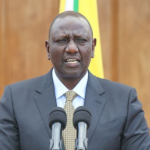
Kenyans Call To Boycott Safaricom, A Govt-Inclined Telco Over Internet Shutdown

Amid the nationwide resistance against the IMF-backed Finance Bill 2024, Kenyans are now calling for a complete boycott of Safaricom, the nation’s largest telecommunications provider.
The resistance, which started June 18 – June 25, 2024, was primarily driven by widespread discontent over excess taxation of the people with little to no accountability from the government. However, the protest turned violent when state police used live ammunition, leading to numerous injuries and deaths of protestors.
During the Tuesday protests, an internet shutdown was experienced despite the Communication Authority’s assurances and a collaborative statement by local and international bodies who rallied against communication blackouts a day earlier.
Safari, amid the protests, claimed a fibre cut, which again was contradicted by a report by local and international bodies, indicating a government-enforced shutdown.
Technology monitoring companies like Cloudflare Radar and NetBlocks confirmed anomalies in internet patterns, lending credence to cases of deliberate interference rather than Safaricom’s claim of a fibre cut.
A new visualization of yesterday's internet disruption in #Kenya during protests shows domestic and downstream country impacts. Key findings:
* No physical subsea cable damage yet identified
* Kenya impact higher than in past cable cuts
* MTN Uganda attributes outage to Kenya pic.twitter.com/GBsPQPOFlH— NetBlocks (@netblocks) June 26, 2024
Also, amid the protests, reports of abduction and arrests of protesters by state police and unidentified security operatives became rampant. Families of the detained victims pointed fingers at Safaricom, accusing the telco of colluding with government forces by allegedly sharing personal information that led to their arrests.
However, in a video on X, Safaricom’s CEO, Peter Ndegwa, denied sharing personal information with the government while reiterating the case of infrastructure failure, such as fibre cut. Ndegwa was once one of the digital delegates who accompanied Ruto to the United States on May 20, 2024, prior to the protests.
Contrary to Ndegwa’s claims or denial, Privacy International released a report indicating, “Law enforcement agents are physically present within telecommunications operators’ facilities, formally, with providers’ knowledge. NIS agents are also informally present in the telecommunication operators’ facilities, apparently undercover, according to current and former Safaricom, CA, and NIS staff.”
With the indication of internet throttle, prominent influencers, online personalities and respected voices have called for a boycott over Safaricom’s unpatriotic stance against the protestors.
Regarding economic implications, this action, as stated in a joint statement by the KICTANet, Paradigm Initiative, and Internet Society Kenya Chapter, indicated concerns, but not one that the government is concerned about.
The digital rights bodies warned that such a shutdown could cripple Kenya’s burgeoning e-commerce sector, valued at approximately KES 269.8 billion ($2.1 billion), and potentially cost the economy KES 810 million ($6.3 million) daily.
Read more: Sierra Leone Passes Bill Banning Early Marriage, Criminalises Offenders
About The Author
Mayowa Durosinmi
author
M. Durosinmi is a West Africa Weekly investigative reporter covering Politics, Human Rights, Health, and Security in West Africa and the Sahel Region
Mayowa Durosinmi
M. Durosinmi is a West Africa Weekly investigative reporter covering Politics, Human Rights, Health, and Security in West Africa and the Sahel Region
Related Articles
Ivory Coast to Buy Unsold Cocoa to Support Farmers
Ivory Coast has announced a government plan to purchase unsold cocoa stock...
ByWest Africa WeeklyJanuary 23, 2026Ghana Moves to Reclaim Kwame Nkrumah’s Former Residence in Guinea
Ghana has embarked on a diplomatic and cultural initiative to reclaim the...
ByWest Africa WeeklyJanuary 23, 2026Senegal Honors Players and Coach After AFCON Triumph
Senegal has formally honored its Africa Cup of Nations winning team, awarding...
ByWest Africa WeeklyJanuary 23, 2026Burkina Faso, Mali, and Niger Turn to Russia for Shared Telecom Network
Burkina Faso, Mali, and Niger have announced plans to develop the Sahel’s...
ByWest Africa WeeklyJanuary 23, 2026











